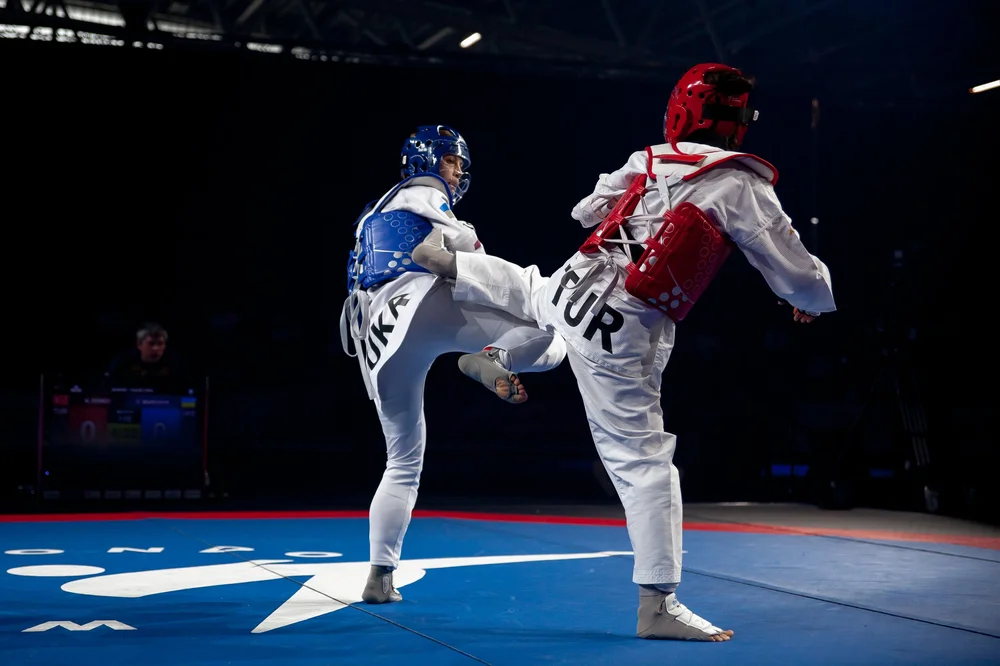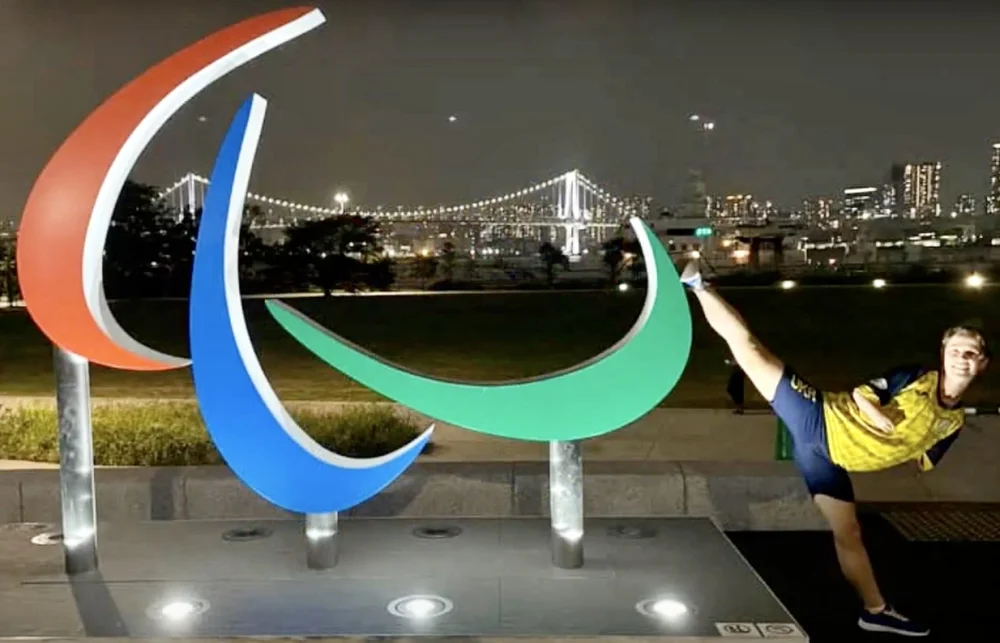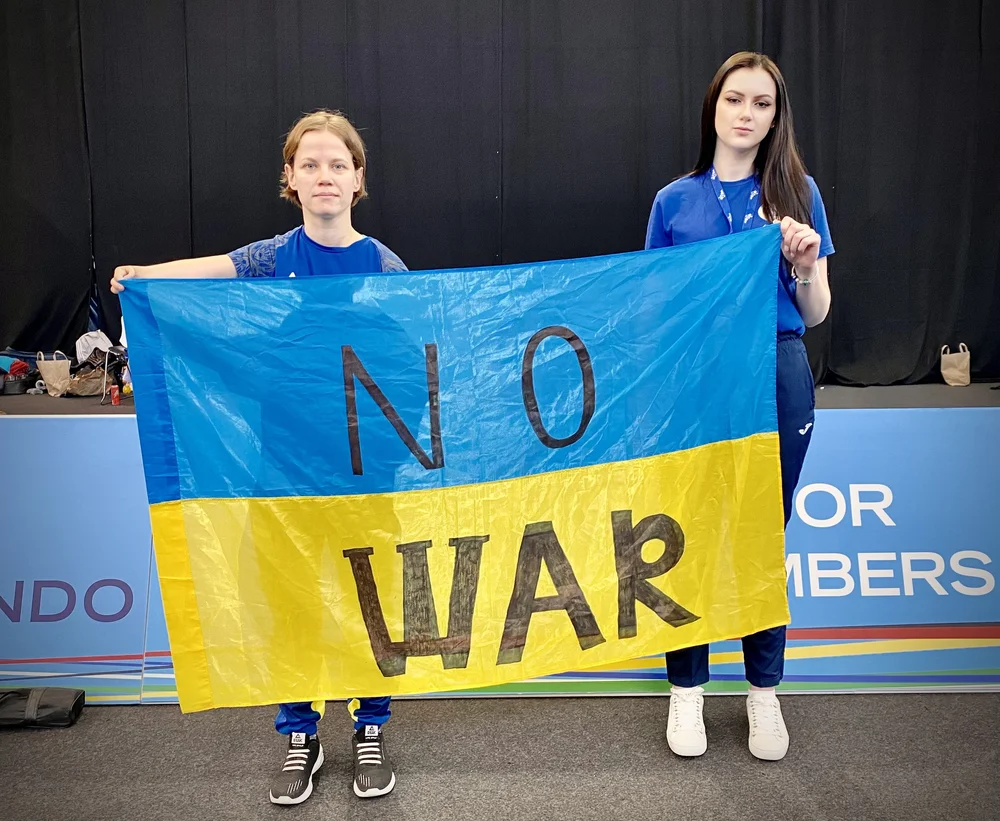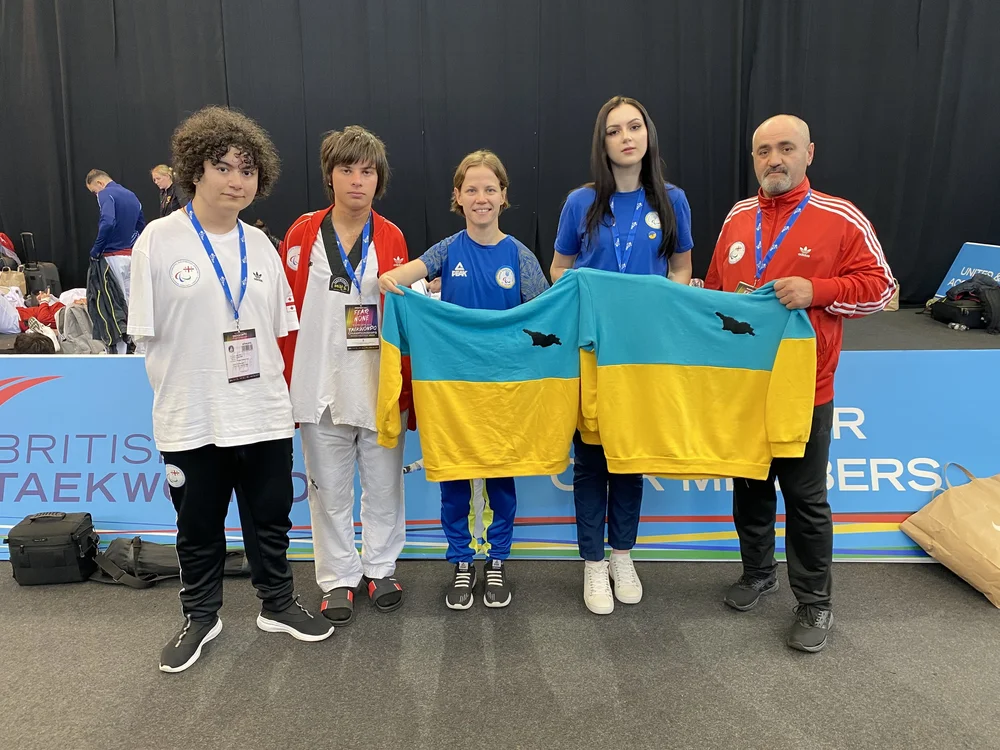One round to go, one minute on the clock, one chance to secure gold for Ukraine.
“I am not a soldier, I cannot hold a gun, but this fight is for my country and everyone at home,” Viktoriia Marachuk told herself as she walked towards her opponent for the last time.
Her heart pounded. She was agitated, anxious, unsure. Not even when hiding in a bunker to escape Russian shelling just months before had she felt quite this way.
These were emotions she had not experienced in competition since her first international event in 2012; where she would claim the first of her six World titles.
Proven Para Taekwondo prowess and a legendary figure in her sport, but this event felt different. To her what was at stake was about so much more than a medal.
In this moment, in Manchester, the champion was not even thinking about the war. Or was she?
From the side lines where I sat, something for the briefest of moments was not right. Her firm focus seemed to slip and that iconic, relentless kicking style slowed.
“That sound, that light it seemed familiar,” she recalls thinking, with increasing panic and alarm, “Then I thought ‘wait, where am I?’”

THREE DECADES EARLIER, IN EASTERN UKRAINE
Viktoriia Marachuk was already a winner in so many senses.
Born with a serious heart condition and under-developed arms, she spent her first year in hospital and freely admits “most doctors thought I would die.”
She survived, but her reward? Abandoned by parents who did not want to a disabled child.
‘Vika’ as she became known, was placed in a foster home until she was four, but then spent a decade in an orphanage where those with mental health problems were “thrown in” alongside youngsters with physical impairments, such as her own.
She still recalls the “screams” from tortured souls which would echo “like something from a horror movie” throughout the cold, hard walled Soviet-era building in Zaporizhzhia – a city which incidentally is home to the largest nuclear power plant in Europe.
“Being in an orphanage was very difficult and extremely hard for me, because growing up in those no-one believes in you and everyone treats you very bad,” she recalls.
“They say that you’re going to be no-one and nothing is going to happen in your life, but it didn’t stop me.”
I DREAMT ABOUT BECOMING A PARALYMPIAN FOR UKRAINE

In her early teenage years she would catch glimpses of sport, including para-sport, on television and despite resistance from ‘carers’ she would be allowed some opportunities.
“People told me it would hurt me, but I tried to pay no attention because I wanted to reach my goal,” she recalls. “I had this dream of going to the Paralympics.
“I was fascinated by people with disabilities and when saw them competing I thought ‘that could be me one day’ out there.”
She tried athletics, swimming, football and tennis, predominantly after being “released” into the world at the age of 14, the age-limit for her orphanage.
In late 2011 she was introduced to a coach who was looking for children with disabilities like hers, who hoped to prepare them to compete in the 2012 Para Taekwondo World Championship.
In short, Vika made rapid progress, claimed gold in her World debut and for the first time in her life a path to progress and a real destiny became clear.
Particularly after Para-Taekwondo became the first combat sport to be granted a place at a Paralympic Games, at Tokyo 2020.
Meet the Ukrainian Para-Taekwondo team
Funding a ‘trail to Tokyo’ was far from not easy
She received just 200 US dollars a month to support her domestic training and the Ukrainian government was unable to offer any additional support for international travel initially.
The pandemic threatened to further derail her preparations with the Paralympics postponed by 12 months, but undeterred she fought on and secured a place at the history-making Games.
“I was so excited because this was my childhood dream, I was literally shocked,” she says.
“It was very difficult for me as this was the period of Covid-19 and there was no audience, spectators, or support but when I entered the arena for taekwondo in Tokyo there were a lot of teams from all over the world and I wanted to cry.
“This felt unreal to me to because we all finally got there no matter what problems were happening in the world.”

For the sport’s Paralympic debut World Taekwondo decided to keep the number of weight divisions and categories to a minimum, which would ensure a greater level of participation in those which were selected.
It ensured a number of contests would have to be navigated before an athlete claimed a medal, much like in the Olympic disciplines, however, it resulted in many athletes fighting against opponents with different disabilities.
Vika was one such figher who competed against those with lesser impairments than her own and despite impressively defeating two rivals, she would lose in the bronze medal fight.
“It was very unusual for me, but I am proud of every single result in my life because it has been very hard for me mentally and physically over many years,” she states with a smile.
“I work very hard, I learn from every event and experience in life that happens to me, but definitely one of my proudest achievements was getting to the Paralympics and winning two fights with the opponents who are not from my class.”
After a post-Games break in late 2021, she returned to training optimistic about her future goals and boosted by news that a greater number of categories would be included for the Paris 2024 Games – a medal could now be a realistic target.
Images courtesy of @Paralympics
FROM FIGHTING FOR SILVERWARE, TO FIGHTING FOR SURVIVAL
An optimistic outlook about her future, and that of her country, changed in the early hours of 24 February 2022.
“It was 5am when we heard the first explosions,” she recalls of the morning when she and her housemate woke suddenly in the city of Zaporizhzhia where they lived.
“Obviously we couldn’t sleep anymore from the noise and then we realised from watching TV that war had started.”
Like many, Vika and her friend were unsure what to do and for several days only air-sirens brought clarity – “go underground and pray the bombing would stop.”
Living close to a nuclear power plant brought obvious added concerns. She had grown up listening to horror stories about the fallout from the Chernobyl disaster, which happened in northern Ukraine four years before she was born.
While her birth defects were not believed to be a result of radiation exposure, others she had encountered and knew of in orphanages around the country were impacted.
Every siren and “unnatural sound” made her shiver, she knew what was at stake.
“The situation in my country was also super difficult and after sheltering for days I decided we had to leave when the bombing became closer, like in our neighbouring city of Nikopol’ on the coast,” she recalls.
“I had a friend, who had a sister in Czech Republic and we were told we could stay there for a while, but we knew the journey would be difficult.”
A challenge yes, and given Vika’s upbringing she was not unfamiliar with trauma, but what she encountered over the next few days she now admits were some of the most harrowing moments of her life.
‘IT WAS COMPLETE HORROR AND HELL’

“At the train station, as you can imagine, there were people everywhere and panicking,” she recalls of the desperate scramble as Ukrainians attempted to flee the city.
“It was too crowded, so much shouting, so many people crying. Families were being separated and police officers began shooting which made it become a compete horror.
“It was complete hell for us.”
What on an ordinary day would have taken a few hours, took over 24 as Vika and her friend made their way West towards the city of Lviv, a relative sanctuary as Russian attacks were predominantly focused on Eastern, central and southern parts of Ukraine.
Lviv is ‘just’ 70km from the Polish border, their next stop enroute to Czech Republic, but there was no onward transport. The rest of the journey had to be completed by foot.
“We were already tired, it was so cold at that time of year too and we had heavy bags with us,” continues the Paralympian.
She fully admits to being “scared” she may not make it through the final part of the journey out of Ukraine, but while there was clear fear among those fleeing, there was also camaraderie and support.
“People would share the bits of food and water we had,” she recalls.
16 hours later Vika made it to the border and admits feeling both “relief and sadness” after passing into Poland, with what and who had been left behind.
Five train journeys later and she would safely make it to a temporary home in Czech Republic.
THE PARA-TAEKWONDO COMMUNITY UNITES FOR UKRAINE

Lisa Gjessing is without doubt the best-known Para-taekwondo athlete. A multiple world champion who won gold at Tokyo 2020, in the -58kg category, the division above Vika’s.
The Danish fighter, in conjunction with the Taekwondo Federation of Denmark, offered her and other Ukrainian team-mates sanctuary – and crucially a place to train – ahead of the European Championships in May.
“It was an incredible offer and we were so grateful, but at the same time I was struggling psychologically,” says the fighter.
“It was very had to train when you’re thinking about your friends and animals which had to stay in Ukraine. The whole life I had before was gone, but people in Denmark were super kind and gave us everything we needed.”
Competitively Vika was progressing well, until days before the tournament she broke a rib during a training session. In para-taekwondo, it can be a common occurrence with kicks to the head banned, meaning blows to the chest carry big points.
She was undeterred, she had come to far not to fight, although there was one final last-minute stress ahead of the flight to the United Kingdom.
“I was still waiting for my passport with the visa I needed to get into the country and two hours before the flight it had still not arrived,” she says while shaking her head.
“My team-mates were all on the bus ready to go an I was on the phone to the delivery driver who was on a motorbike trying to find us.”
It arrived and they made their flight – just.
BACK TO THE EUROPEAN CHAMPIONSHIPS IN MANCHESTER

Despite an eye-watering, stabling pain from the broken rib she felt each time she was kicked Vika impressively progressed through two fights before reaching that European final.
Vika led heading into the closing stages against Nuricihan Ekinci from Turkey, an opponent she had beaten previously.
Then, something happened. From the side of the mat, less than 15m away, it wasn’t clear what and the Ukrainian herself looked confused.
Her defence lapsed, Ekinci struck Vika’s body protector with a kick, the score flashed to 13-12 in the Turkish fighter’s favour and moments later the buzzer sounded to end the contest.
The silver medallists shook her head, she looked stunned.
After walking off the mat and towards the mixed zone for our post competition interview she gained clarity.
“I was winning but in some moment I panicked, I got scared of all the shouts around and the lights, it reminded me of, well, you know,” she shrugged. “For a moment I was back there.”

Flashbacks to the trauma of Russian attacks and fleeing from her homeland had been triggered by experiences in the competition ring, likely – she admits – due to a form of post-traumatic stress disorder (PTSD).
Vika was clearly disappointed at “missing the most important moment” of the contest, but as she stepped onto the podium and received her silver medal, she began to smile.
“I am extremely proud to be fighting for Ukraine and win a medal for my country,” she says.
“It has been a very difficult time thinking about what’s happening in my country, it adds pressure to me because I realise that I must fight, that sport is also a fight for the victory where you overcome problems.
“I really hope there will be peace in my country and this war will end.
“Until then, I may be a refugee supported in Denmark now, but I will continue fighting for Ukraine and hopefully will see my nation’s flag flying high when I win again.”
Before we conclude our interview she interjects to add one further thought, after thinking through an earlier question about what her achievements mean after being told she ‘would not achieve anything’ as a little child in the orphanage.
“My message to the children is to believe in yourself because there is nothing impossible in this world, no matter what people say to you,” she states.
“Work hard, ignore those who doubt you and keep fighting for your dreams like I have.”
Images courtesy of GB Taekwondo and James Fowles Photography.
